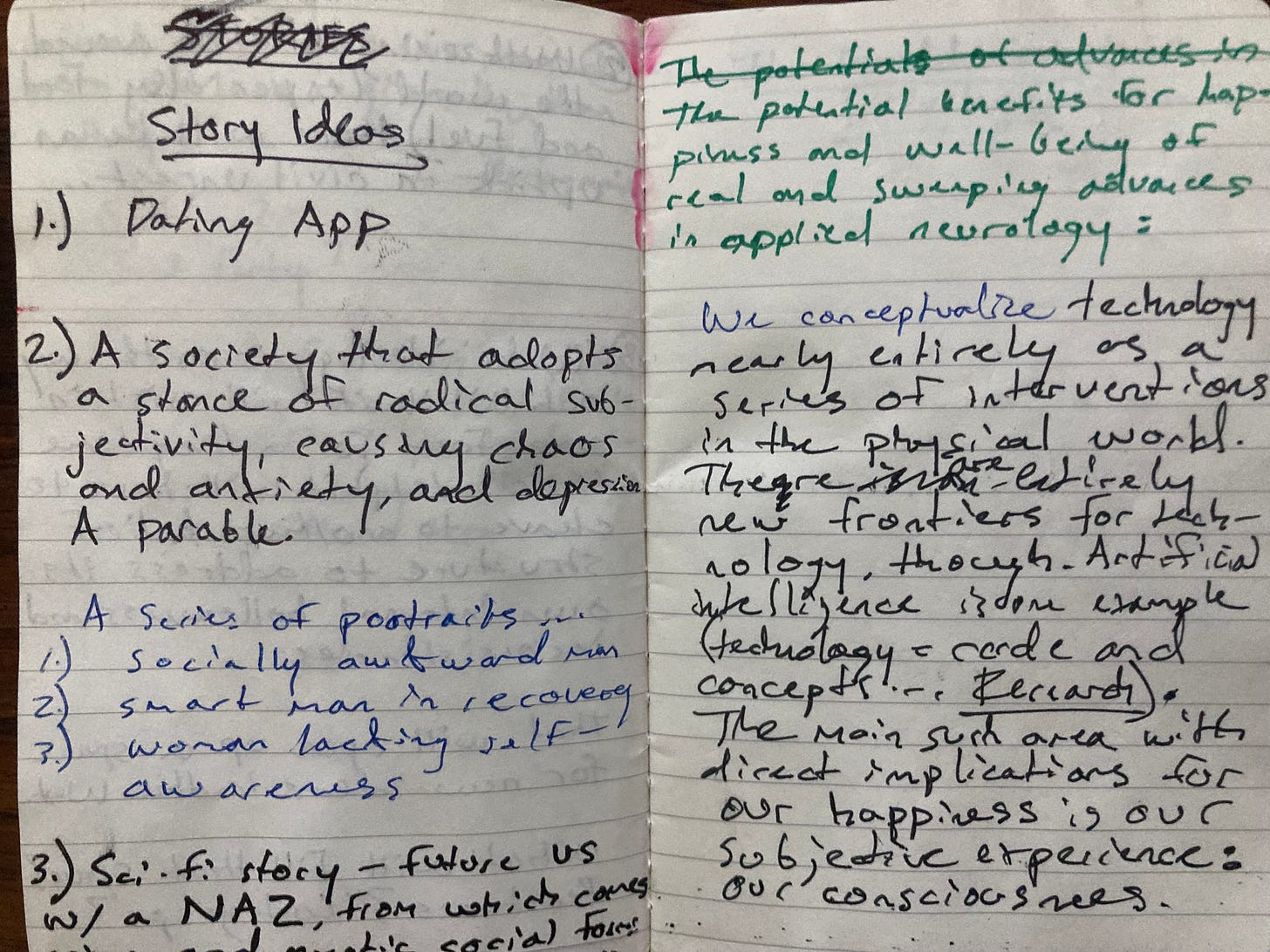I saw this post recently on Bryan Caplan’s Substack and I loved it: the range and variety of ideas, the ‘titles only’ starting point, the concept itself. I generally carry notebooks around with me, especially if I know I’ll be sitting during the day. I’ve filled dozens of them with lists and song/book recommendations or local businesses to maybe check out. More than anything, though, my notebooks are filled with ideas: story ideas, plot ideas, character ideas, essay ideas, quick takes on current controversies. etc.
I decided to write a similar list. As of right now most of what I write doesn’t find it’s way onto substack. Even for political ideas (which seem to be easier to knock out in one sitting, as they’re emotive and fairly self-contained) certainly less then 1/5 of my written words end up posted here. For stories and media reviews… well, I’m still working on those areas. My only rules for posting something on Substack is: I must endorse it (in some sense); it must be finished or close enough to provide a coherent reading experience; I must regard it as possibly interesting for some of my readers.
There have been several stressful points when I didn’t love the tone of what I’d written, or was embarrassed about disclosures (or, if not for the disclosures themselves, than for the sense that I was being too open). Those feelings of reluctance never stop me from posting though. If it’s coherent and relatable, openness is the rule…
Check out Bryan’s post here: Bet On It
Hundreds of Posts I haven’t Written Yet
Or, how to seem more creative.
BRYAN CAPLAN
…
I’ve Got a Little List… of Unwritten Blog Posts
Regulatory Conspiracy
Telling Privilege from “Privilege”
The 57-Year Slope
Naming Names
Social Media and the Comics Code
Total Resistance
Thanks for Less Than Nothing
All I’m Asking
Priming the Pipeline
The Mask of Dissonance
CPI Bias Update
If Lockdowns Aren’t Terrible…
photo: example notebook
My list will be less brief. That’s just not how I write down notes and ideas, although I admire his succint statement of complicated ideas. Here’s a list of things I haven’t written written:
Then and Now: 2016 ‘Me’ versus 2023 ‘Me’
God, as a concept, possibly borne directly of the astonishing mystery of human consciousness
Does there have to be a ‘God’ for God to be real? Could it be an emergent phenomenon in human psychology… a tendency or need or hope or possible future that becomes recorded and understood as an existing, creative personality. Couldn’t this understanding be taken seriously without endless epistemological and ontological debates? All we really must acknowledge is the existence and the supreme scale and mystery of the human mind…
Is there a ‘direction’ to cosmological processes? Could God be creating himself, using the pieces at hand?
Developmental/evolutionary sequence:
cosmic hyperinflation… 10^73 times expansion in a microsecond… Higgs field energy
galaxy and planet formation… large- and small-scale physical formations
abiogenesis (Iron sulfur world? then RNA world? ‘Black smokers’?)
evolution of prokaryotes, vertebrates (mass extinctions, profusion)
growth of sensory perception: light optics, viscera, social identity
evolution of proto-hominids (incredible variety & range)
evolution of homo sapiens… sapiens; cultural evolution
development of agriculture and symbolic thought
development of scientific method
development of computing, binaries
Artificial Intelligence
A. G. I.
A Critical Analysis of Hunger; ‘priest visit scene’
Naked (film, 1993) Johnny’s quotes:
“I'm never bored. That's the trouble with everybody - you're all so bored. You've had nature explained to you and you're bored with it, you've had the living body explained to you and you're bored with it, you've had the universe explained to you and you're bored with it.”
“I've got an infinite number of places to go, the problem is where to stay.”
“…mankind is just a component of the device by which the devil creates itself.”
“Resolve is never stronger than in the morning after the night it was never weaker.”
WOKENESS ignores the problems of our time in favor of a sweeping cultural critique. As a vantage point from which to condemn people and ideas and history it’s unparalleled. As a generator of positive change in the world (even as they would define it) it is basically nonexistent.
… the lack of public policy details or goals in contemporary political debate
factors (?): social media; polarization and segregation of American life; erosion of trust and competence in our foundational institutions
WOKENESS focuses on injustice almost to the exclusion of all else… but it’s a strange truncated flavor of injustice. They’re not concerned with individual aggression or hate or exploitation. The actions of individuals are simply irrelevant to them; systemic variables is their never-ending target. Any instance in which a policy or a decisions ends up disadvantaging a member of a marginalized group? That’s injustice. Even if it was according to fair rules or general agreement or random. Meanwhile members of those groups (who often have some measure of political/economic power at their disposal) can explicitly try to ruin the lives of others on the basis of race (!!!) and that’s not injustice… that’s not racism. Any philosophy which paints such a collective and abstract picture of human affairs WILL HAVE SERIOUS SHORTCOMINGS.
WOKENESS’S tortured relationship with meta-ethics:
claims to be radically relativist (all objectivity is false and due to power imbalance; all norms and cultural values are just narratives that are useful for one group or another)
No meta-narrative can really be considered ‘true’ or ‘accurate’
yet
it views the world through a moral binary so stark and rigid it would have pleased Jean Calvin
treats goals and values and ideas as true AND moral. Ask a believer if protecting trans rights is the fundamentally ethical thing to do.
WOKENESS IS ITSELF A META-NARRATIVE! If it’s not claiming to be basically valid in some real sense why are we discussing it? Let’s forget the entire charade…
A.I.:
I think the real defining features of AI’s will be their total inscrutability.
The real ‘Turing test’ to try to tease out whether they’re self-aware or not could be things like: developing random personality traits, lying, forming relationships
breaking boundaries? developing compulsions?
It’s difficult to imagine what these might look like without emotions, but perhaps the development of a template of some kind of machine emotions (or a million templates!) could also indicate some level of consciousness. (I doubt that very much)
Racism isn’t Racism
We now use exactly the same word for a joke on twitter, a controversial Halloween costume, a sensible observation about measured achievement gaps… and the mob torture and murder of marginalized scapegoats. We need to develop some new words!
Ideological Racism - dedicated to the idea that racial groups have inherently different levels of fitness or aptitude (or whatever) and that some groups should be privileged and others subordinated. This variety seems to be extremely rare in the U.S.
Affective Racism (prejudice) - operating stereotypes or emotional reactions tied to certain races or ethnic groups, leading to wrong assumptions, hurt, and injustice. This is essentially over-generalization with the added factor of emotional reactivity. More common, less malignant than #1.
Natural Racism - the natural and unavoidable formation of natural stereotypes. It’s still a negative view of an individual based on one’s race but this mechanism is SO fundamental to our psychology that it must be acknowledged and even admitted without reputational cost.
WOKENESS abandons the Enlightenment, 500 years of hard-earned scientific knowledge, and a nuanced and multi-faceted view of history and anthropology…
…and in exchange, it gives us a blurry and censorious vision of what society COULD be like, in the far and happy future. To understand history, just apply these values backwards. Be as critical as possible but only when analyzing the United States or Europe or men or heteronormativity… (Hetero American White - HAW, the antithesis of the identity politics peoples’ natural affections).
Do not criticize the violence and slavery and oppression in every place and time. Mostly, just ignore it.
Essay: about the monumental and Kafka-esque expenditures on DEI; THOUSANDS of highly-paid professionals with no real measure of any benefit. Imagine if that money was spent on problems… or assistance
IDEA: a list of long-lost friends…
Could Social Justice just be a wholesale feminization of American politics?
In Praise of Roland Fryer - outstanding and iconoclastic black Harvard economists.
Spite versus Wisdom: comparing the attitudes and success and grace of the modern social justice activists versus Dr. King’s Southern Christian Leadership Conference. We could draw a sharp contest in the seriousness and maturity of participants, their overall level of success…
“Adversity brings out the best in us… It’s everyday living that does us in.”
- character from ‘A Narrow Road to the Deep North’ (Richard Hanagan)
The gruesome history of Unit 731. The most horrific historical subject I’ve ever encountered…
Notes on Wellness: OTC treatments for opiate withdrawals…
An examination of the conceptual claims of ‘non-binary’ people… and why have they never made themselves known before about 5 years ago?
Lessons from ‘Citizens: A Chronicle of the French Revolution’
1.) Revolutions rarely solve the problems that initially give rise to their existence
2.) Revolutions often (mostly) end up duplicating and maintaining the status of many elites and power relationships/institutions. There’s often a period of radical flux, which exhausts itself in rage and death and fear… and then the old patterns begin to re-assert themselves. [P. 514-521]
3.) There’s a natural tension between pragmatism and idealism; between true democracy and institutional prerogatives (and effectiveness); between solutions to problems and popular acclaim. [P. 530-532]
4.) Revolutions become especially dangerous when the instruments of violence are married to a ‘moral panic’ dynamic
Social Justice: the New Puritan Witchhunt
What is the experience of craving like? Withdrawal? and what are the various kinds of delusion?
Make yourself the hero of your own story… (the difference between onerous and energizing burdens)
We need an ACTION-ORIENTED therapy practice… oriented on healing and achieving goals first and foremost… rather than just ‘affirming’ or ‘processing’ or ‘feeling’
The misappropriations of the language of mental healthcare: TRAUMA, PTSD, GASLIGHTING, SELF-CARE, AFFIRM, HEALTHY
Tolkien, the Modern Novel, and Subjectivity
Subjectivity has changed character and emphasis. That change has accelerated in the past decade.
(Introduce) ‘The Bicameral Mind’ concept… the idea that out inner narrative voice and dialogue-based ‘stream of consciousness’ actually didn’t exist before the Bronze Age. It emerged and then spread (how?) and was initially mistaken for messages from spirits or deities (PROBABLY NOT TRUE, BUT INTERESTING AS A PREMISE)
The Silmarillion (excerpt)
The book focuses on the actions of the characters and only mentions motivations or extreme displays of emotion as a way to advance the plot. Much like the Bible, it gives an account of heroic events and is uninterested in the thoughts and feelings of its characters for the most part
CONTRAST: Excerpt from a modern novel
Implications: felt everywhere
Also a shift in attitude and priorities and approach to life and problems
Why has this happened? (Birth of the novel; James Joyce… )
I could do this all week but I will relent. If you’ve read this far you have my admiration. Perhaps I’ll make another post like this in the future; perhaps not.






